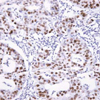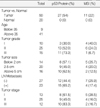Abstract
Purpose
Breast cancer shows various molecular and genetic alterations in its development and progression. Microsatellite alterations, and especially microsatellite instability (MSI) and loss of heterozygosity (LOH), have recently been postulated as a novel mechanism of carcinogenesis and as a useful prognostic factor for several gastrointestinal malignancies. LOH is related to the allelic loss of various tumor suppressor genes; however, MSI has been found to be the result of an erroneous DNA mismatch repair system and this has been known to be involved in the carcinogenesis of the hereditary non-polyposis colon cancers and some portion of the sporadic colorectal or gastric cancers. Yet MSI has rarely been studied in invasive ductal carcinoma. Our objectives were to evaluate the MSI and p53 protein expression in invasive ductal carcinomas and to correlate this with various clinicopathological factors.
Methods
The MSI analysis was performed by using polymerase chain reaction with five polymorphic microsatellite markers (the BAT25, BAT26, D2S123, D5S346 and D17S250 loci as recommended by the 1998 NCI International Workshop on Microsatellite Instabilitis and RER phenotypes) in 50 surgically resected tumors and each of their non-tumorous counterpart. The p53 protein expression was studied using immunohistochemistry.
Results
MSI and a p53 protein expression were detected in 22% and 54% of the tumors and non-tumorous tissues, respectively. MSI was more frequently detected in tumor grade I, T-stage I, non-metastatic tumor and tumor stage I. Also there were rare cases showing a high grade and stage with metastasis in the MSI-high group, in which more than 3 microsatellite loci had MSI. The p53 expression results correlated well with a higher tumor grade. Correlation between MSI and the p53 expression was not found.
Figures and Tables
 | Fig 1Representative MSI pattern of BAT25 (left) and D17S250 (right) markers in invasive ductal carcinoma. Each T lane shows mid-lower band gain.
N=normal; T=Tumor.
|
 | Fig 2On immunohistochemical stain for p53, the tumor cells of invasive ductal carcinoma show strong nuclear expression. |
References
1. 2002 Annual Report of the Central Cancer Registry in Korea. 2003. Republic of Korea: Ministry of Health and Welfare;11.
3. Hollingsworth AB, Singletary SE, Morrow M, Francescatti DS, O'Shaughnessy JA, Hartman AR, et al. Current comprehensive assessment and management of women at increased risk for breast cancer. Am J Surg. 2004. 187:349–362.

4. Weisenbach J, Gyapay G, Dib C. A second-generation linkage map of the human genome. Nature. 1992. 359:794–801.

5. Ionov Y, Peinado MA, Malkhosyan S, Shibata D, Perucho M. Ubiquitous somatic mutations in simple repeated sequences reveal a new mechanism for colonic carcinogenesis. Nature. 1993. 363:558–561.

6. Loeb L. Microsatellite instability: marker of a mutator phenotype in cancer. Cancer Res. 1994. 54:5059–5063.
7. Eshleman J, Markowitz S. Mismatch repair defects in human carcinogenesis. Hum Mol Genet. 1996. 5:1489–1494.

8. Leach F, Nicolaides N, Papadopoulos N, Liu B, Jen J, Parsons R, et al. Mutations of a mutS homolog in hereditary nonpolyposis colorectal cancer. Cell. 1993. 75:1215–1225.

9. Peltomaki P, Lothe R, Aaltonen L, Pykkanen L, Nystrom-Lahti M, Seruca R, et al. Microstallite instability is associated with tumors that characterize the hereditary non-polyposis colorectal carcinoma syndrome. Cancer Res. 1993. 53:5853–5855.
10. Aaltonen L, Peltomaki P, Leach F, Sistonen P, Pylkkanen L, Mecklin J, et al. Clues to the pathogenesis of familial colorectal cancer. Science. 1993. 260:812–816.

11. Peltomaki P, Lothe R, Aaltonen L, Pykkanen L, Nystrom-Lahti M, Seruca R, et al. Microstallite instability is associated with tumors that characterize the hereditary non-polyposis colorectal carcinoma syndrome. Cancer Res. 1993. 53:5853–5855.
12. Lothe RA, Arzimanoglou II, Gilbert F, Barber HR. microsatellite instability in human solid tumors. Cancer. 1998. 82:1808–1820.

13. Miyoshi E, Haruma K, Hiyama T, Tanaka S, Yoshihara M, Shimamoto F, et al. Microsatellite instability is a genetic marker for the development of multiple gastric cancers. Int J Cancer. 2001. 95:350–353.

14. Momoi H, Itoh T, Nozaki Y, Arima Y, Okabe H, Satoh S, et al. Microsatellite instability and alternative genetic pathway in intrahepatic cholangiocarcinoma. J Hepatology. 2001. 35:235–244.

15. Dobosz T, Lukienczuk T, Sasiadek M, Kuczynska A, Jankowska E, Blin N. Microsatellite instability in thyroid papillary carcinoma and multinodular hyperplasia. Oncology. 2000. 58:305–310.

16. Jo HJ, Yun KJ, Moon HB. Expression of p21, p53 and bcl-2 proteins in invasive ductal carcinoma of the breast. Korean J Pathol. 2003. 37:393–399.
17. Kim JK, Song YJ, Cho SI, Ryu DH, Yun HY, Sung RH. Clinicopathologic significance of p53 and c-erbB-2 protein expression in breast carcinoma. J Korean Surg Soc. 2002. 62:282–287.

18. Boland CR, Sato J, Saito K, Carethers JM, Marra G, Laghi L, et al. Genetic instability and chromosomal aberrations in colorectal cancer: a review of the current models. Cancer Detect Prev. 1998. 22:377–382.

19. Boland CR, Thibodeau SN, Hamilton SR, Sidransky D, Eshleman JR, Burt RW, et al. A National Cancer Institute Workshop on Microsatellite Instability for cancer detection and familial predisposition: development of international criteria for the determination of microsatellite instability in colorectal cancer. Cancer Res. 1998. 58:5248–5257.
20. Siah SP, Quinn DM, Bennett GD, Casey G, Flower RL, Suthers G, et al. Microsatellite instability markers in breast cancer: a review and study showing MSI was not detected at 'BAT 25' and 'BAT 26' microsatellite markers in early-onset breast cancer. Breast Cancer Res Treat. 2000. 60:135–142.

21. Molist R, Remvikos Y, Dutrillaux B, Muleris M. Characterization of a new cytogenetic subtype of ductal breast carcinomas. Oncogene. 2004. 23:5986–5993.

22. Murata H, Khattar NH, Kang Y, Gu L, Li GM. Genetic and epigenetic modification of mismatch repair genes hMSH2 and hMLH1 in sporadic breast cancer with microsatellite instability. Oncogene. 2002. 21:5696–5703.

23. Pizzi C, Panico L, De Marchis L, Mastranzo P, Di Maio M, D'Amico C, et al. p53 expression is decreased in primary breast carcinomas with microsatellite instability. Breast Cancer Res Treat. 2002. 73:257–266.

24. Mendez O, Manas S, Peinado , Fabra A, Escobedo A, Moreno A, et al. Microsatellite instability is associated with the loss of apoptosis in ductal breast carcinomas. Breast Cancer Res Treat. 2001. 65:171–177.

25. Kim DJ, Park JY, Lee MH, Sohn YK. The role of microsatellite instability at chromosome 11p15.5 in the progression of breast ductal carcinoma. J Korean Med Sci. 2004. 19:698–703.

26. Hoang JM, Cottu PH, Thuille B, Salmon RJ, Thomas G, Hamelin R. BAT-26, an indicator of the replication error phenotype in colorectal cancers and cell lines. Cancer Res. 1997. 57:300–303.
27. Regitnig P, Moser R, Thalhammer M, Luschin-Ebengreuth G, Ploner F, Papadi H, et al. Microsatellite analysis of breast carcinoma and corresponding local recurrences. J Pathol. 2002. 198:190–197.





 PDF
PDF ePub
ePub Citation
Citation Print
Print






 XML Download
XML Download